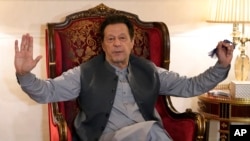The United States said Wednesday it had objected privately and publicly to last year's visit to Russia by Pakistan's then-prime minister, Imran Khan, but rejected allegations that Washington had played a role in his removal from power weeks later.
State Department spokesman Mathew Miller made the comments in response to an alleged Pakistani diplomatic cable, known internally as a cipher, documenting a March 7, 2022, meeting between two American officials and Islamabad's then-ambassador to the U.S., Asad Majeed Khan.
An American news outlet, The Intercept, published for the first time Wednesday what it said is the text of the cipher, which Imran Khan has long held up as evidence of his claim that his defeat in a parliamentary no-confidence motion was engineered by Washington.
According to Ambassador Khan’s purported cable, the State Department officials at the meeting encouraged him to tell Pakistan's powerful military that if Khan were removed from office over his neutrality on the Russian invasion of Ukraine, Islamabad could expect warmer relations with Washington.
Miller was asked Wednesday at his regular news briefing whether he would know the veracity of the leaked Pakistan cable or offer a reaction to the reported U.S. comments.
"I can't speak to whether it's an actual Pakistani document. … With respect to the comments that were reported, I am not going to speak to private diplomatic exchanges,” he said.
Miller added that even if the comments in the purported cable were accurate as reported, they show the United States is expressing concern about Khan's "policy choices" rather than expressing its "preference" on who the leadership of Pakistan ought to be.
"We expressed concern privately to the government of Pakistan as we expressed concerns publicly about the visit of then-Prime Minister Khan to Moscow on the very day of Russia's invasion of Ukraine. We made that concern quite clear."
In his reported cipher, the ambassador said that the State Department officials warned him that if Khan were not ousted, Pakistan would face economic and political isolation.
The leaked cipher identified the U.S. official leading the conversation as Donald Lu, assistant secretary of state for south and central Asian affairs.
"I think if the no-confidence vote against the Prime Minister succeeds, all will be forgiven in Washington because the Russia visit is being looked at as a decision by the Prime Minister. … Otherwise, I think it will be tough going ahead," the document quoted Lu as telling the Pakistani ambassador.
On March 8, a day after the reported meeting in Washington, an alliance of Pakistani opposition parties moved a no-confidence vote against Khan, seeking his removal from office over alleged misrule and mismanagement of the economy.
Khan summoned a meeting of his national security committee, which comprises the country's top political and military leadership, where participants discussed the content of the cipher.
The post-meeting statement condemned U.S. "interference" in Pakistan's internal affairs. Subsequently, the foreign ministry summoned Washington's ambassador to Islamabad to formally protest over it.
Miller reiterated Wednesday that allegations that the United States had interfered in internal decisions about the leadership of Pakistan "are false, they have always been false, and they remain false."
The no-confidence vote removed the cricket-star-turned-prime-minister from office a month later, which Khan denounced as illegal and accused the United States of plotting. His staunch political rival, Shehbaz Sharif, swiftly replaced him as Pakistan's new prime minister.
Khan for months organized massive nationwide rallies, during which the cipher and the alleged U.S. conspiracy against his government would dominate his speeches to cheering crowds of tens of thousands of supporters.
"Well, the cipher is a reality. It was an official meeting [that] initiated [conversation on] both sides, between Donald Lu, the undersecretary of state for South Asia, and the Pakistan ambassador, and this was brought to the National Security Committee and Cabinet," Khan told VOA in an interview earlier this year.
"Having said that, it's in the past; we have to move on. It's in the interest of Pakistan to have good relations with the U.S., and that's what we intend to do," he said.
Khan has consistently accused former military chief General Qamar Javed Bajwa, who stepped down last November, of colluding with Sharif and the U.S. to topple his government. He alleges the current army chief, Gen. Asim Munir, is carrying forward Bajwa's mission to eliminate Khan, who remains the most popular national politician, and his party, the country's largest political force. The military denies the charges.
Last week, Khan was sentenced to three years in prison and subsequently banned from national politics for five years for alleged embezzlement of official gifts. He has rejected the charges as politically motivated and orchestrated by the military.
The U.S. State Department on Monday said that the arrest of Khan, a harsh critic of Washington, was an "internal matter" and declined to take a position on legal troubles facing the former prime minister.
Pakistani authorities have imprisoned thousands of PTI workers since last May for allegedly ransacking public and military property during protests sparked by Khan's brief arrest in a separate case. The detainees have been languishing in jails, and defense attorneys allege judges are delaying hearings under pressure from the military.
Pakistani news channels are banned from airing Khan's name, images and statements.
Pakistan's military has ruled the South Asian nation of about 240 million people for nearly half its 76-year history by staging coups against elected governments. Critics say generals have meddled in political affairs even when they are not in power and orchestrated the toppling of prime ministers because they had fallen out with the military.
Meanwhile, Sharif dissolved the legislative National Assembly, the lower house of parliament, late on Wednesday, setting the stage for a national election by November in line with the country's constitution.
VOA Islamabad Bureau Chief Sarah Zaman and State Department correspondent Cindy Saine contributed to this report.










